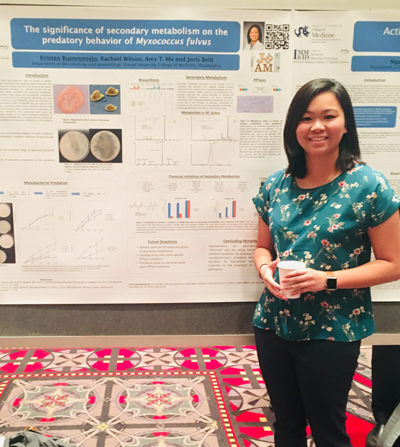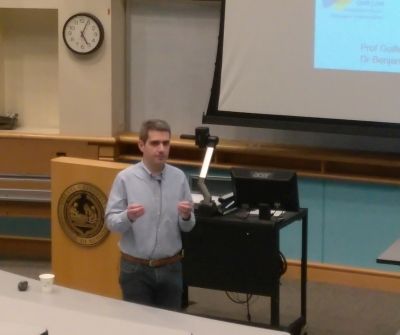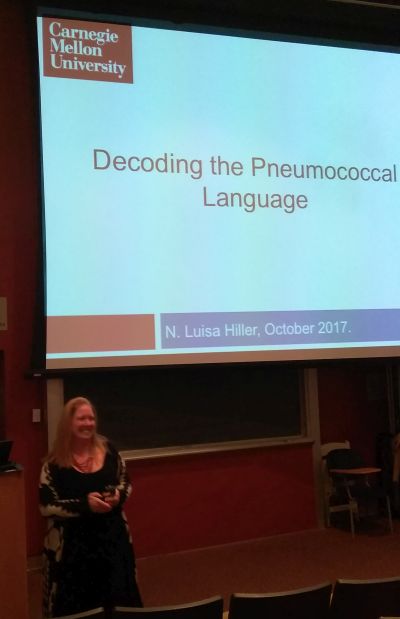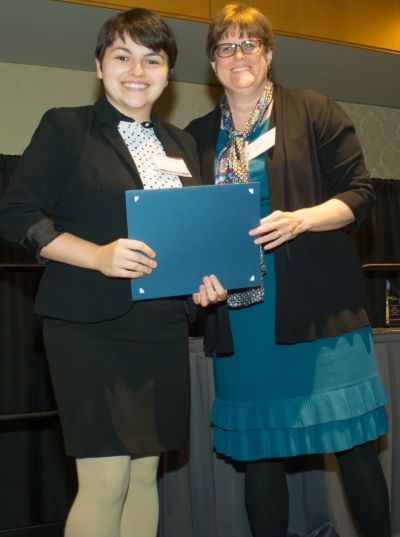News Archive
2018
Students Present at Discovery Day
October 23, 2018: Students in the Beld, Ma and Mell Labs, including graduate students Danielle Piazza, Haley Majer, Amanda Platt, Breanna Tyrell, Kristen Buenconsejo, Tucker Collins (mentored by Sandhya Kortagere) and medical student Nga Ying Eng, presented posters at Discovery Day in the Philadelphia Convention Center. Kristen Buenconsejo won a Junior Graduate Student Poster award for her poster, "The Significance of Secondary Metabolism on the Predatory Behavior of Myxococcus fulvus."
Discovery Day is an all-day annual event of intellectual pursuit and discovery, which is organized to celebrate the basic and clinical research accomplishments of the graduate, medical and undergraduate students, clinical research coordinators, postdoctoral fellows, and residents and fellows affiliated with the College of Medicine.
 Danielle R. Piazza presenting "Dissecting Mechanisms of Variation of Genome Wide Transportation in Haemophilus influenzae" at Discovery Day
Danielle R. Piazza presenting "Dissecting Mechanisms of Variation of Genome Wide Transportation in Haemophilus influenzae" at Discovery Day
 Kristen Buenconsejo with her award-winning poster, "The Significance of Secondary Metabolism on the Predatory Behavior of Myxococcus fulvus" at Discovery Day
Kristen Buenconsejo with her award-winning poster, "The Significance of Secondary Metabolism on the Predatory Behavior of Myxococcus fulvus" at Discovery Day

Donald Hall Presents at ASM Conference
October 7 – 11, 2018: Donald C. Hall Jr., PhD candidate in the Departments of Microbiology & Immunology and Chemistry, presented his poster entitled "JEKMag Tech: High Throughput Technology to Grow and Assess Bacterial Biofilm Sensitivity to New Drugs" at the 2018 American Society for Microbiology Conference on Biofilms in Washington, D.C.
The conference provided an interdisciplinary platform to discuss the latest biofilm research. Topics included the molecular basis and regulation of biofilm formation, biofilms in natural and industrial systems, diagnosis and study of clinically-relevant biofilms, and emerging technologies and their application to biofilms.

"Omics Studies in Ecological Interactions"
September 12, 2018: Garth Ehrlich, PhD, hosted his postdoctoral researcher, Yves Mone, PhD, at the IMMID research seminar. Dr. Mone joined the Ehrlich Lab after serving as a researcher at the Health Department of the French Institute for Development (IRD).
Dr. Mone's research focuses on the complexities of Lyme disease.
"Towards Translational Evolutionary Biology Using the Lens of Genomics"
On Wednesday, April 25, Joshua Chang Mell, PhD, hosted Vaughn Cooper, PhD, associate professor of microbiology and molecular genetics at the University of Pittsburgh's School of Medicine.
Dr. Cooper presented his research, entitled "Towards Translational Evolutionary Biology Using the Lens of Genomics." The primary goal of Dr. Cooper's lab is to understand how bacterial populations evolve and adapt to colonize hosts and cause disease.

"Discovering the Dark Matter of Microbial Secondary Metabolism"
On Wednesday, February 21, Joris Beld, PhD, hosted Mohammad Seyedsayamdost, PhD, assistant professor of chemistry at Princeton University. Dr. Seyedsayamdost presented his research, entitled "Discovering the dark matter of microbial secondary metabolism." His current research focuses on triggering secondary metabolism in diverse bacteria and natural product discovery.
"The Cholera Bacterium: Human Pathogen and Bacterial Predator"
On Wednesday, February 14, Amy Ma, PhD, hosted Stefan Pukatzki, PhD, professor of immunology and microbiology at the University of Colorado's School of Medicine.
Dr. Pukatzki presented his research, entitled "The Cholera Bacterium: Human Pathogen and Bacterial Predator." His current research focuses on the molecular mechanisms that drive microbial pathogenesis.

"Gastrointestinal Symptoms in Children with ASD: The Chicken, or the Egg?"
On Wednesday, January 17, Garth Ehrlich, PhD, hosted Steve Walker, PhD, associate professor, Department of Neuroscience, Institute for Regenerative Medicine at Wake Forest University's School of Medicine.
Dr. Walker presented his research, which focuses on using molecular tools, including whole-genome microarrays, to understand the biological basis for autism spectrum disorder (ASD), in a talk entitled "Gastrointestinal Symptoms in Children with ASD: The Chicken, or the Egg?"

2017

"Deciphering the Pneumococcal Language"
On Wednesday, October 18, Garth Ehrlich, PhD, hosted Luisa Hiller, PhD, assistant professor, Department of Biological Sciences at Carnegie Mellon University.
Dr. Hiller presented her research, entitled "Deciphering the Pneumococcal Language." Her lab is interested in understanding the role of bacteria in both health and disease, particularly the commensal pathogen Streptococcus pneumoniae.

CAMP Student Courtney Fesko Wins Discovery Day Prize
Courtney Fesko, a CAMP student in the Biochemistry master's degree program, received second place in the "Outstanding Junior Graduate Student Poster" category at Discovery Day 2017.
Fesko's poster was titled "Metabolite production of a probiotic E. coli strain." Her advisor is Joris Beld, PhD, an assistant professor in the Department of Microbiology & Immunology.
Discovery Day, the College of Medicine's annual research day, was held on Thursday, October 12, at the Pennsylvania Convention Center.
Dr. Ehrlich Honored at Graduate School Awards
Each year, faculty members of the Graduate School for Biomedical Science and Professional Studies are recognized for their outstanding research accomplishments and contributions to graduate education. Garth Ehrlich, PhD, received the Established Investigator Award during this year's ceremony, held on May 11 at The Logan.

Recipients of the 2017 Graduate School Faculty Awards, including Garth Ehrlich, PhD (second from right)
JUNE 1, 2017
CD4 Hunter, the first educational mobile game app developed by the Institute for Molecular Medicine and Infectious Disease is available. FREE download at Apple and Google Play App Stores. Watch the CD4 Hunter trailer.
CD4 HunterTM combines fast-paced game play with science learning to showcase the first step of the complex and dynamic replication cycle of the human immunodeficiency virus type 1 (HIV-1): binding and attachment. The app will be available for free download on Apple and Google Play app stores on June 1 and will be presented at Microbe 2017, the annual meeting of the American Society for Microbiology (ASM) held in New Orleans, June 1-5, 2017. CD4 Hunter was developed "in house" by the Center for Business and Program Development of the Institute for Molecular Medicine and Infectious Disease (IMMID), at Drexel University College of Medicine. Learn more.
Dr. Krol at Zoonoses Conference

Dr. Jaroslaw Krol (center, facing camera), CAMP laboratory manager, tours Camp Funston, a U.S. Army training camp located on Fort Riley, southwest of Manhattan, Kansas. The tour was one of several social activities at the 8th International Conference on Emerging Zoonoses, where Dr. Krol presented a poster entitled "RELA Inhibitors for Treatment of Chronic Bacterial Infections."
Dr. Ehrlich Gives Keynote Address
Garth Ehrlich, PhD, professor of microbiology and immunology, presented the keynote lecture at the 8th International Conference on Emerging Zoonoses, Manhattan, Kansas, on May 8, 2017. His talk was titled "Toward Re-Potentiating Antibiotics Against Bacterial Biofilms and Persisters Through an Understanding of Bacterial Physiology."

Dr. Ehrlich presenting his keynote lecture.

Sean F. Bradley, PhD, presents his research.
"Natural Products From Uncultured Bacteria"
On Wednesday, March 29, Joris Beld, PhD, hosted Sean F. Bradley, PhD, Howard Hughes Medical Institute, Tri-Institutional Associate Professor, Head of the Laboratory of Genetically Encoded Small Molecules, The Rockefeller University. Dr. Brady's research interests center on both the discovery and the functional characterization of new small molecules from previously inaccessible genetic sources. His presentation at the IMMID research seminar was called "Natural products from uncultured bacteria." Learn more about Dr. Brady and his lab.
Scientists have made new headway in understanding how a deadly pathogen evolves during chronic lung infections in cystic fibrosis patients. "By looking at changes in the genome over time, we were able to see patterns — common themes that help us to better understand how this particular species evolves in its environment and how CF patients become chronically infected," said study co-corresponding author Joshua Chang Mell, PhD, an assistant professor at Drexel University College of Medicine. Drexel Now (March 21, 2017)

Mark Shirtliff, PhD, presents "Applying 'omics in the discovery of diagnosis and prevention strategies" at the March 1 Institute for Molecular Medicine & Infectious Disease research seminar.
"Applying 'omics in the discovery of diagnosis and prevention strategies"
On Wednesday, March 1, Garth Ehrlich, PhD, hosted Mark E. Shirtliff, PhD, professor, Department of Microbial Pathogenesis, Dental School of the University of Maryland. Dr. Shirtliff studies biofilms using both in vivo and in vitro systems. His presentation at the IMMID research seminar was called "Applying 'omics in the discovery of diagnosis and prevention strategies."

Jeffrey Lawrence, PhD, presents his research at the February 1 Institute for Molecular Medicine & Infectious Disease research seminar.
"Speciation Cascades in Bacterial Diversification"
On Wednesday, February 1, Garth Ehrlich hosted Jeffrey Lawrence, PhD, professor and chair of genome evolution at the University of Pittsburgh. Dr. Lawrence presented his research, directed toward elucidating the evolution of bacterial genomes, including their size, composition, variability and organization, at the IMMID research seminar. His talk was called "Speciation Cascades in Bacterial Diversification."

Rob Beiko, PhD, presents his research at the January 25 Institute for Molecular Medicine & Infectious Disease research seminar.
"Identifying Key Temporal and Taxonomic Bacterial Clusters in the Aging Microbiome"
On Wednesday, January 25, Joshua Chang Mell, PhD, assistant professor, Department of Microbiology & Immunology, hosted Rob Beiko, PhD, professor of computer science at Dalhousie University, Nova Scotia. Dr. Beiko presented his research, focused on disease prevention and treatment through the implementation of bioinformatics at the IMMID research seminar. His talk was called "Identifying Key Temporal and Taxonomic Bacterial Clusters in the Aging Microbiome."

Rosie Redfield, PhD, presents her research at the January 11 Institute for Molecular Medicine & Infectious Disease research seminar.
"'Do Bacteria Have Sex?' And Other Questions We've Gotten Wrong"
On Wednesday, January 11, Garth Ehrlich, PhD, professor in the Departments of Microbiology & Immunology and Otolaryngology-Head & Neck Surgery, hosted Rosie Redfield, PhD, professor of zoology at the University of British Columbia. Dr. Redfield discussed her research, which focuses on natural competence, the ability of many bacteria to take up DNA from their surroundings, at the Institute for Molecular Medicine & Infectious Disease's research seminar. Her talk was titled "'Do Bacteria Have Sex?' And Other Questions We've Gotten Wrong."
2016

Kevin Mason, PhD, presents his research at the November 2 Institute for Molecular Medicine & Infectious Disease research seminar.
"Nutritional Immunity Promotes Pathoadaptation and Persistence of Haemophilus influenzae"
On Wednesday, November 2, Garth Ehrlich, PhD, professor in the Departments of Microbiology & Immunology and Otolaryngology-Head & Neck Surgery, hosted Kevin M. Mason, PhD, principal investigator, Center for Microbial Pathogenesis, The Research Institute at Nationwide Children's Hospital, and assistant professor of pediatrics, Center for Microbial Interface Biology, The Ohio State University. Dr. Mason presented a talk entitled "Nutritional Immunity Promotes Pathoadaptation and Persistence of Haemophilus influenzae" at the Institute for Molecular Medicine & Infectious Disease's weekly research seminar.
"Dating Species and Strain Origins"
On Wednesday, October 26, Garth Ehrlich, PhD, professor in the Departments of Microbiology & Immunology and Otolaryngology-Head & Neck Surgery, hosted Sudhir Kumar, PhD, director of the Institute for Genomics and Evolutionary Medicine, and Carnell Professor of Biology at Temple University. Dr. Kumar presented his research, entitled "Dating Species and Strain Origins," at that the Institute for Molecular Medicine & Infectious Disease's weekly research seminar.
Discovery Day 2016
The faculty and students of the Center for Advanced Microbial Processing showcased their original research at Drexel University College of Medicine's annual Discovery Day on Thursday, October 20. Held for the first year at the Pennsylvania Convention Center, Discovery Day is a venue for students and scientists to present their research in a professional setting to faculty and colleagues from Drexel University and its neighboring institutions.

Summer undergraduate research fellow Gabrielle Rose Beam presents her poster to Joris Beld, PhD, an assistant professor at Drexel University College of Medicine.

Joris Beld, PhD, with SURF student Gabrielle Rose Beam (middle) and undergraduate volunteer, Rachael Wilson (right), at Discovery Day 2016.
"Knowledge-Guided Integration of Biological Datasets to Increase Experimental Power"
On Wednesday, October 12, Garth Ehrlich, PhD, professor in the Departments of Microbiology & Immunology and Otolaryngology-Head & Neck Surgery, hosted Bernie J. Daigle Jr., PhD, assistant professor of the Departments of Biological Sciences and Computer Science at the University of Memphis. Dr. Daigle presented a talk entitled "Knowledge-Guided Integration of Biological Datasets to Increase Experimental Power" at the Institute for Molecular Medicine & Infectious Disease's weekly research seminar.
Suresh G. Joshi, MD, PhD, Is Recognized and Elected as Fellow to Infectious Diseases Society
The nation's leading infectious diseases professional society, the Infectious Diseases Society of America (IDSA), recognizes the distinguished physicians and scientists from the United States and around the world, and the board of directors elects them as fellows to IDSA. This fellowship honors those nationals and internationals that have achieved professional excellence and provided significant service to the profession through practice, education, mentoring and research in infectious diseases, medical microbiology and public health. On August 10, 2016, Dr. Joshi's contribution over the past 28 years and the services rendered in this field has been recognized by IDSA. Dr. Joshi is director of the Center for Surgical Infection & Biofilm at the Institute for Molecular Medicine and Infectious Diseases, and he is an adjunct professor at the A.J. Drexel Plasma Institute, as well as Drexel's School of Biomedical Engineering, Science & Health Systems.
Back to Top